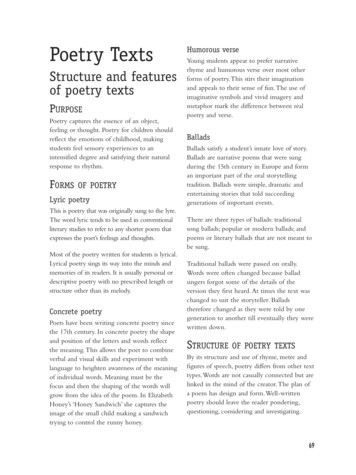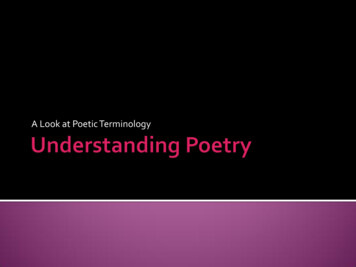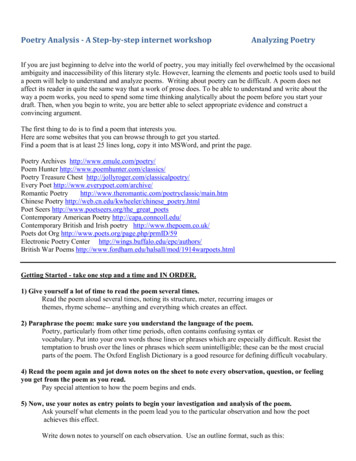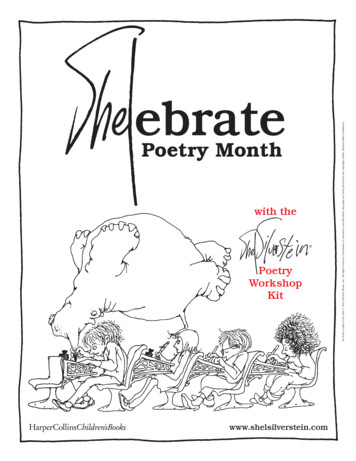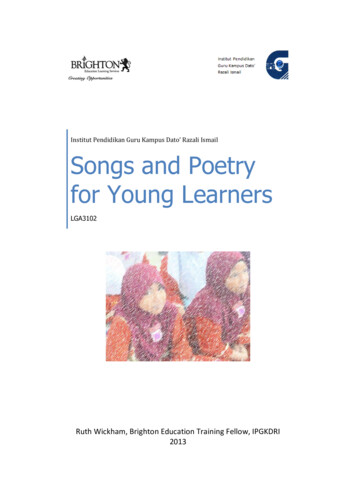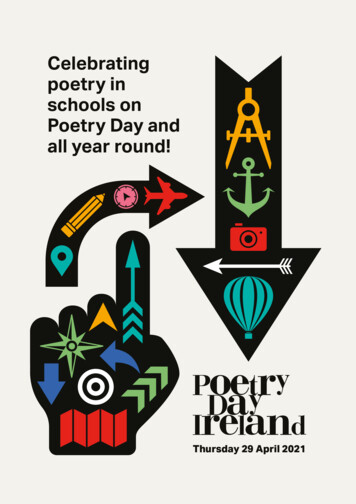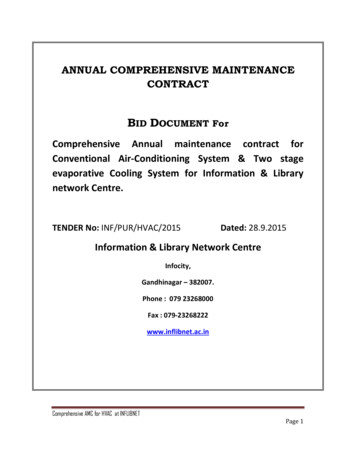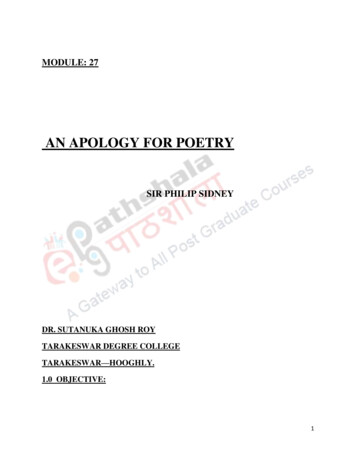
Transcription
MODULE: 27AN APOLOGY FOR POETRYSIR PHILIP SIDNEYDR. SUTANUKA GHOSH ROYTARAKESWAR DEGREE COLLEGETARAKESWAR—HOOGHLY.1.0 OBJECTIVE:1
Our study material will tell us briefly about the life of Sir Phillip Sidney, one of the major poetsof the sixteenth century and in more detail about his chief work An Apology For Poetry.1.1 GENERAL INTRODUCTIONSir Philip Sidney (1554-1595) was a courtier,soldier, statesman, scholar and a distinguished poetof the sixteenth century. He lived during theElizabethan age, so was a contemporary ofShakespeare. We should recall that what we call theElizabethan Age is really the English Renaissance.It begins in Italy and makes it to England during theage of Elizabeth. In the essay he both explores thecore concepts and answers to earlier criticism ofpoetry. We shall first discuss how he praises poetryfor being the cradle of civilization, for being achannel of divine power, for teaching as well asdelighting, and for combining and surpassing thevirtues of history and philosophy. We shall thenmove on to show how he refutes the mainarguments made against poetry.In order to have a total understanding of the text, weneed to travel back in time. It is not just today thatpeople have wondered if poetry is worthwhile. It has always had its critics. Like all critics beforehim, Sidney knew that he would have to answer not only contemporary attacks but he alwayshad to answer Plato. Plato was always in the background, and was the raison d'etre. DuringSidney‟s time there was no standard model of English literary criticism. Sidney‟s predecessors inthe field of literary criticism suffered from a myopic vision. Critics like Wilson, Ascham or Elyotcannot be regarded as full-fledged critics. Their myopic vision confined them to the discussion ofthe formal aspects of literature only. Sidney could see much more clearly than hiscontemporaries. He is the first critic of English literature and real criticism began in Englandwith Sir Philip Sidney. In this sense he is an innovator, who broke away from the early criticaltradition and created his own.Chaucer had the critical spirit in him but it did not find the proper trajectory. In 1473,Richard de Bury (1281-1345) published the original Latin version of the Philobiblon. It is a weakattempt as it suffers from a narrow outlook. William Caxton ( c. 1422-91), the first literary iconof fifteenth century England showed some critical significance in his prefaces to the books hechoose for printing. His critical observations are regarded as the first impressionistic„appreciations‟ in the history of English literary criticism. Sir Thomas Elyot‟s ( c. 1490-1546)The Book Named the Governor ( 1531) lacks the deep critical insight. Roger Ascham ( 1515-68)2
in his Taxophilus ( 1545) strongly advocated the use of English, as he was a purist he totallydisapproved the introduction of foreign words into the English language. In Schoolmaster(1570) he clearly shows his affinity with the misomousoi or „ poet haters‟ of the time. ThomasWilson‟s ( c. 1525-81) The Art of Rhetoric ( 1553) can be regarded as the first modern treatise onEnglish composition.Sidney‟s An Apology For Poetry is a class of its own,altogether different from these critics. It was first publishedposthumously in 1595 in two separate yet more or less identicaleditions by two printers. The one which was brought out byWilliam Ponosby was called The Defence of Poesie. AnApologie for Poetrie is the title of the work brought out byHenry Olney. Sidney was greatly influenced by the Italianrenaissance writers. We are to remember that before theRenaissance the critical vision was shrouded in darkness.Sidney took a bold step to emerge from this medieval darknessinto light. He wrote the first treatise on literary theory usinghumanist concepts. One thing that we should remember aboutSidney's Apology; is that even though it is a brilliant work, it ismore synthetic than original. In other words, most of the ideas that he conveys in this defense,have been said before by Aristotle, Horace and others. Yet what Sidney brings to it is anincredible polish. He has selected, adapted from many sources in order to arrive at his ownconception of poetry.In this unit we are going to learn: Sidney‟s Defence and Gosson‟s Abuse Sidney‟s Apology For Poetry Sidney‟s View of the Antiquity and Universality of Poetry Sidney‟s Definition of Poetry Poetry as Superior to History and Philosophy The Various Kinds of Poetry Four Chief Objections to Poetry Sidney‟s Review of English Poetry and Drama[Type sidebar content. A sidebar is a standalone supplement to the main document. It is often aligned on the left or right of thepage, or located at the top or bottom. Use the Text Box Tools tab to change the formatting of the sidebar text box.3
Type sidebar content. A sidebar is a standalone supplement to the main document. It is often aligned on the left or right of thepage, or located at the top or bottom. Use the Text Box Tools tab to change the formatting of the sidebar text box.]nd Drama Sidney‟s View of Poetry.1.2 HISTORICAL BACKGROUNDThTThhThTheThe immediate cause of Sidney‟s writing the essay was Stephen Gosson‟s The Schoole ofAbuse (1579), which was unauthorizedly dedicated, to Sidney and questioned the morality ofpoetry and other forms of literature. Apology was written in the sixteenth century renaissanceliterary climate that was concerned about aesthetic problems regarding the object and purpose ofpoetry itself. Thus unlike Thomas Lodge‟s Defence of Poetry (1580), Sidney‟s Apology is muchmore than a reply to Gosson. He proceeds to give an argument for the value of poetry and itssocial significance also.Gosson was essentially guided or misguided by the spirit of sour Puritanism. He hasdescribed his work as „a pleasant invective‟; however the readers have an unpleasant experiencewhile reading it. The general feeling is of coarseness, as the entire essay is full of claptrapexpressions----„poets are the whetstones of wit‟ „that wit is dearly brought. Where honeyand gall are mixed, it will be hard to sever the one from the other‟. When Gosson wrote thisessay he was just twenty-four, he wanted instant fame, instead he became infamous. He suffered4
essentially from the Malvolio complex and spared none. His was a typical case of those „whoseek a praise by dispraising others‟.Let us refer to the following lines from Sidney, which clearly states the occasion of hiswork: .who ( I know not by what mischance) in these my not old years and idlest times, havingslipped into the title of a poet, am provoked to say something unto you in the defence of that myunelected vocation, which if I handle with more good will than good reasons, bear withme .And yet I must say that, as I have just cause to make a pitiful defence of poor poetry,which from almost the highest estimation of learning is fallen to be the laughing-stock ofchildren, so have I need to bring some more available proofs, since the former is by no manbarred of his deserved credit, the silly latter hath had even the names of philosophers used to thedefacing of it, with great danger of civil war among the Muses. (1-2)One thing which we should put clearly in our mind is that Sidney‟s outlook is a moral one.At a glance Sidney‟s aesthetic principle may appear to be Horation, however he transcendsHorace‟s aim of teaching and delighting. He strongly emphasizes the ability of poetry to movemen towards perfection. He takes en route to Plato and creates a Neo-Platonic ideal world for thepoet. He advocates this ability of the poet to move men to more virtuous action. This essence ofSidney‟s theory places poetry on the same pedestal which was formerly ascribed to scriptures.The full title of Gosson‟s work is: „The School of Abuse, containing a pleasant invective againstpoets, Pipers, Players, Jesters and such like Caterpillars of a Commonwealth; setting up the Flagof Defiance to their mischievous exercise and overthrowing their Bulwarks by Profane Writers,Natural reason and common experience; a discourse as pleasant for Gentleman that favourlearning, as profitable for all that will follow virtue’.5
1.3 SIDNEY’S APOLOGY FOR POETRYNature never set forth earth in so rich tapestry as divers poets have done; neither with pleasantrivers, fruitful trees, sweet smelling flowers, nor whatever else may make the too-much lovedearth more lovely; her world is brazen, the poets only deliver a golden ( 6).Sidney in his Apology states that poetry alone transcends nature. Though he was„provoked‟ by Gosson, (we have already noticed that in his own writings quoted above) Sidney‟sApology is more than a work of criticism, it is a remarkable piece of literature. The essay restoresour faith in poetry as well as in ourselves. He has not confined himself within narrow criticalthoughts, rather his clarity and elegance makes him stand tall above others. One of the maintenets of sixteenth century Protestantism is that man is not virtuous and is incapable of doing anygood to himself or to the society at large. Sidney‟s essay is reflective of the humanisticworldview. Thus he was much ahead of his times.And that the poet hath that idea is manifest, by delivering them forth in such excellency as hehath imagined them. Which delivering forth also is not wholly imaginative, as we are wont to sayby them that build castles in the air: but so far substantially it worketh . (7).Whereas the sixteenth century Protestantism thought otherwise Sidney reiterates his beliefin humanity and substantiated his point by arguing that the poet‟s creativeness is the highesthuman faculty. . this purifying of wit, this enriching of memory, enabling of judgment, and enlarging ofconceits, which commonly we call learning, under what name so ever it comes forth, or to whatimmediate end so ever it be directed, the final end is to lead and draw us to as high a perfectionas our degenerate souls, made worse by their clayey lodgings, can be capable of” (140).1.4 SIDNEY’S VIEW OF THE ANTIQUITY AND UNIVERSALITY OF POETRYh6
When the right virtuous Edward Wotton and I were at the Emperors court together, we gaveourselves to learn horsemanship of John Pietro Pugliano, one that with great commendation hadthe place of an esquire in his stable. And he, according to the fertileness of the Italian wit, did notonly afford us the demonstration of his practice, but sought to enrich our minds with thecontemplations therein which he thought most precious.(1).This is how Sidney begins his essay, on a rather curious note we would say. Beforelaunching a defence of poetry, Sidney justified his stand by referring in a half-humorous mannerto a treatise on horseman-ship by Pietro Pugliano. If the art of horsemanship can deserve such aneloquent eulogy and vindication, surely poetry has better claims for eulogy and vindication.Sidney finds a just cause to plead a case for poetry since it has fallen from the highest estimationof learning to be „the laughing stock of children.‟ The equerry was always busy blowing his owntrumpet. From Pugliano Sidney learnt this trick of magnifying his own vocation as well ashorsemanship. At first he is resolved to establish poetry as the mother of all knowledge. He isconcerned with the antiquity and universality of poetry. He goes on to establish the fact thatpoetry is respected in all ages and in all countries, even in uncivilized countries.Among the Romans a poet was called vates, which is as much as a diviner, forseer orprophet (4) let us see how the Greeks named it and how they deemed of it. The Greeks calledhim a „poet‟ which name hath, as the most excellent, gone through other languages. It cometh ofthis word, poiein, which is „ to make‟: wherein I know not whether by luck or wisdom, weEnglishmen have met with the Greeks in calling him a maker: which name, how high andincomparable a title it is, I had rather were known by marking the scope of other sciences than bymy partial allegation ( 5-6).According to Sidney all other human arts are subordinate to nature; poetry alonetranscends nature, since the poet is a maker. Shelley‟s Defence of Poetry is inspired by Sidney‟sApology For Poetry. In order to have a better understanding we can refer to Shelley‟s commentin this context. He says “None deserves the name of Creator, but God and the poet‟. As God, thecreator, creates his own universe, the poet too has his own world. To attack poetry is to attack theroots of culture, to attack poetry is to attack the universality of poetry itself.1.5 SIDNEY’S DEFINITION OF POETRYPoesy therefore is an art of imitation, for so Aristotle termeth it in his word mimesis, that is tosay, a representing, counterfeiting, or figuring forth-----to speak metaphorically, a speakingpicture----with this end, to teach and delight. (8).7
In his definition of poetry he follows both Aristotle and Horace : „to teach and delight‟.He gives emphasis to the didactic purpose of this Horation notion that poetry must teach ordelight, in order to encourage and inspire people to acquire knowledge and thus move out ofbarbarism. Poetry is an art of „imitation‟ and its chief function is to teach and delight. Imitationdoes not mean mere copying or a reproduction of facts. It means a representing or transmuting ofthe real and actual, and sometimes creating something entirely new. In this context we shouldremember the significant phrase „speaking picture‟. Both Plato as well as Aristotle has drawnparallel between poetry and painting. In Ars Poetica Horace mentions it as ut picture poesis.Taking the cue from Horace, Sidney speaks of poetry as the „speaking picture‟.Sidney then goes on to classify different kinds of poetry-----sacred poetry, philosophical ordidactic poetry and the right kind of poetry. The poets who write sacred poetry, the teachers ofreligion and prophets are essentially theologists, hence they have their own limitations. Thephilosophical or didactic poets are restricted within their own boundaries as they are dependantfor their material on external sources. He draws special attention to this third group of poets. Thethird group of poets are the „ real makers‟, as Shelley says, „ the unacknowledged legislators ofthe world‟.Sidney makes poetry free from any kind of external limitations---like metrical patterns.it is not rhyming and versing that maketh a poet----no more than a large gown maketh anadvocate (9).Verse is the outer skin and not the flesh and blood of poetry. We should remember thatverse is just an ornament and not essential to poetry.We should remember that rhyme and metre are not essential for poetry, but they harmonize thelanguage and help to the memory.1.6POETRY AS SUPERIOR TO HISTORY AND PHILOSOPHYIn the next part of his essay Sidney looks closely at the roles of philosopher as well ashistorian in relation to the poet. He argues that poetry is above both history and philosophy, as,The philosopher therefore and the historian are they which would win the goal, the one byprecept, the other by example. But both, not having both, do both halt Now doth thepeerless poet perform both: for whatsoever the philosopher saith should be done, he giveth a8
perfect picture of it in some one by whom he presupposeth it was done, so as he couplet thegeneral notion with the particular example. (13).In other words, Poetry is superior to the other two in teaching the essential human virtues. Evenif we consider poetry as an art or craft, following Aristotle‟s definition of poetry, it is superior toall. Sidney believes that poetry can move men to better, more virtuous individuals, rather thansimply teaching. In the promotion of virtue, both philosophy and history play their individualparts. Philosophy deals with its theoretical aspects and teaches virtue by precept whereas historyteaches practical virtue by drawing concrete examples from life. But poetry combines bothprecepts and practical examples. Philosophy, being based on abstractions, cannot properly guidethe youth. On the other hand, the historian is tied to empirical facts. His example draws nonecessary consequence. Poetry gives perfect pictures of virtue which are far more effective thanthe mere definitions of philosophy. It also gives imaginary examples which are more instructivethan the real examples of history. The reward of virtue and the punishment of vice is moreclearly shown in Poetry than in History. Poetry is superior to Philosophy in the sense that it hasthe power to move and achieve virtuous action. It presents moral lessons in a very attractiveform. Things which in themselves are horrible as cruel battles, unnatural monsters, are madepleasant in poetic imitation. Poet is, therefore, the monarch of all sciences.Poetry is superior to philosophy: the poet gives a perfect picture. The poet is the rightphilosopher. Poetry is more philosophical and superior to history.1.7 THE VARIOUS KNDS OF POETRYSidney now focuses his attention to several kinds of poetry. Pastoral poetry, elegiacpoetry and satiric poetry, according to Sidney are all wholesome. The pastoral poetry treats of9
the beauty of the simple life, and sometimes, of the miseries of the common people under Lordsand nobles. Elegiac poetry deals with the weakness of mankind and wretchedness of the world. Itevokes pity. Satiric poetry laughs at folly, and iambic poetry tries to unmask villainy. He laysundue stress on the moral aspects of comedy. Comedy is an imitation of the common errors ofour life presented in a ridiculous manner. It helps men keeping away from such errors. Tragedy,is replete with „sweet violence‟ and it makes us remain grounded when we realize that life is fullof uncertainties. The lyric which gives moral precepts and soars to the heavens in singing thepraises of the God, can never be displeasing. Nor can the epic or heroic poetry be dislikedbecause it inculcates virtue to the highest degree by portraying heroic and moral goodness in themost effective manner. Sidney asserts that the heroical is „not only a kind, but the best and mostaccomplished kind of poetry.‟1.8 FOUR CHIEF OBJECTIONS TO POETRYAccording to Sidney, Plato was not against poetry in general but he lAfter the general discussion on poetry, Sidney now argues against specific critiques ofpoetry. First---poetry is useless---a waste of time, second—poetry is deceptive the mother of alllies, third—poetry is immoral—the nurse of abuse, fourth—Plato would have none of it and sobanished poets from his republic. In answer to the first charge, Sidney argues that to call poetryuseless is begging the question itself.FOUR CHIEF OBJECTIONS TO POETRY:1.2.3.4.Its uselessnessIts falsehoodIts corrupting effectPlato‟s condemnation of poetry.10
Now let us put it in simple words---the statement—that it is by denouncing the mereprerequisite for the accusation---a poet intends to state the ( or a) truth, is itself invalid. Poetry isnot the falsest art, it is the truest form of art, as it does not actually pretend to factual truth. TheAstronomer, the Geometrician, the historian, and others, all make false statements .But while apoet is not a liar, the immorality of poetry is actually its abuse. So what he presents is not fact butfiction embodying truth of an ideal kind. If rightly used, poetry does most good. In answer to theeffeminizing effect, Sidney says that it is the stock abuse against all learning. Poetry alone hasthe ability to rouse man to virtuous action. The fourth and last accusation against poetry isperhaps the greatest treason according to Sidney. He thinks Plato was against the wrong opinionsof the gods and atheism which poetry in ancient times talked of. According to Sidney, Plato wasnot against poetry in general but he leveled his charges against a particular kind of poetry whichwould create a harmful effect on human minds and society in general. Plato had warned againstthe abuse of poetry as he with all reverence described the poet in Ion asA light and winged and holy thing. ( Ion ,157).So as Plato, banishing the abuse, not the thing, not banishing it, but giving due honour unto it,shall be our patron and not our adversary. (36).1.9 SIDNEY’S REVIEW OF ENGLISH POETRY AND DRAMASidney now reviews the pathetic state of poetry in England. He uses the term poetry in itsoriginal Greek sense, which denotes not only poetry but all sorts of imaginative literature likedrama. He sadly recounts England‟s step motherly attitude towards the poets of his time whounfortunately are ranked with the mountebanks. He strikes at the root cause of this poeticaldecadence----the tendency of the poets to write uninspired writing---invita Minerva. He repeatsthe old tagline---A poet is born and not made:Poesy must not be drawn by the ears; it must be gently led, or rather it must lead ( 39).A threesome combination of art, imitation and exercise goes on to make poetry successful.According to Sidney, since Chaucer there are few good poems in England. He mentionsChaucer‟s Troilus and Criseyde, but sadly leaves out his magnum opus, The Canterbury Tales.He mentions Sackville, Surrey and Spenser. Strangely, strangely he ignores Langland‟s PiersPlowman or Tottel‟s Miscellany.However this doomed state of drama is somehow redeemed by Gorboduc though this playlacks the unities of time and place. Sidney prescribes that a tragedy should be tied to the laws ofpoetry and not of history. A dramatist should have liberty to frame the history to his own tragicalconvenience. Furthermore Sidney analyses that tragedy is not always maintained in a well-raisedadmiration (42).11
Comedy on the other hand degenerates into something farcical or immoral. Often laughter incomedy is confused with pleasure. Sidney stresses that comedy should aim at delightful teachingand not vulgar amusement.Neither is he hopeful about English lyric poetry which has undergone degeneration andhas become tame and artificial during this age. The affected eloquence has turned toofashionable. The metaphors are too farfetched. In the next part of the essay he praises the Englishlanguage as it is the most suitable for poetry. It is adaptable both to ancient and modern systemsof versification. Sidney‟s bold view of English language has successfully paved its way forfuture development. He comes to a closure with a peroration wherein he sums up the claims ofpoetry. All the charges laid against it are false and baseless. He ends with a request that poetryshould never ever be degraded. Moreover the contemporary poets were inferior men withmercenary motives. They lacked the genuine love for poetry. They also lacked the training andpractice that is necessary to write successful poetry. He blesses people who love poetry andthreatens people who are allergic to poetry in general. He wrote the essay in a light heartedmanner. He gives an adequate answer to the puritan approach of his age. The end too ishumourous enough to make us fall in love with poetry once more and behold Sidney as the firstcritic!LET US SUM UP: Sidney‟s Apology For Poetry is more than a work of criticism, it is a work of literature. Poetry is the mother of all knowledge. Poetry alone transcends nature. Plato is not against poetry, he warned against the abuse of poetry.QUESTIONS:Answer the following questions: (15 marks).1. Discuss An Apology for Poetrie as a typical specimen of Renaissance criticism.2. Discuss Sidney‟s contribution as a critic. Can he be called the father of English3.4.5.6.7.8.criticism?.How did Sidney react to Stephen Gosson‟s School of Abuse? Why was it necessary forSidney to defend poetry?Discuss the limitations of Sidney‟s criticism.Write an essay on Sidney‟s view of poetry. What is the most important function ofpoetry? Is Sidney‟s view original?Write an essay on Sidney the „classicist‟. Do you detect any „romantic traits‟ in him?Sidney is indebted to Greek and Latin critics. Discuss.What was the impact of Italian criticism on Sidney?12
9. Discuss Sidney‟s arguments for the superiority of poetry to history and philosophy.10. Is verse essential to poetry? Discuss Sidney‟s standpoint.Answer the following questions: (7 marks).1. What are the principal subdivisions of poetry postulated by Sidney?2. How does Sidney refute the major objections leveled against poetry in his own day?3. Discuss Sidney‟s view regarding the dramatic unities. Comment on Sidney‟s review4.5.6.7.8.9.10.of tragicomedy.Analyse Sidney‟s review of English poetical literature.Comment on Sidney‟s review of English dramatic literature.Enumerate Sidney‟s view of the true nature of tragedy.Enumerate Sidney‟s view of the state of English tragedy in his time.What are the observations of Sidney on the true nature of comedy?Do you agree with Sidney‟s view about the state of English comedy in his time?Summarise Sidney‟s observations on the diction of English poetry.Answer the following questions (4 marks).1. Explain. “Nature never set forth the earth in so rich tapestry divers poets havedone Her world is brazen, the poets only deliver a golden”.2. “Poesy therefore is an art of imitation with this end, to teach and delight.” Ispoetry an art of imitation?3 “ his [ the historian‟s] example draweth no necessary consequence.” Explain.4. Examine “ the Comedy is an imitation of the common errors of our life”.5. Explain. “ .the poet only bringeth his own stuff, and doth not learn a conceit outof a matter, but maketh matter for a conceit.”6. Do you agree with Sidney‟s view that “ .Now for the poet, he nothing affirms,and therefore never lieth.”7. “.our erected wit maketh us know what perfection is, and yet our infected willkeepeth us from reaching unto it.” How does Sidney define wit?8. Comment. “ .poesy must not be drawn by the ears; it must be gently led, or ratherit must lead.”9. What is Sidney‟s view about the English language?13
10. Explain. “ .where the whole tract of a comedy should be full of delight, as thetragedy should be still maintained in a well-raised admiration.”MULTIMEDIA LINKS TO EXPLAIN THE TEXT:Sources: http://www.enotes.com/topics/defence-poesie http://www.poetryfoundation.org/bio/philip-sidney http://en.wikipedia.org/wiki/An Apology for Poetry http://en.wikipedia.org/wiki/Philip Sidney14
poetry itself. Thus unlike Thomas Lodge‟s Defence of Poetry (1580), Sidney‟s Apology is much more than a reply to Gosson. He proceeds to give an argument for the value of poetry and its social significance also. Gosson was essentially guided or misguided by the spirit of sour Puritanism. He has
